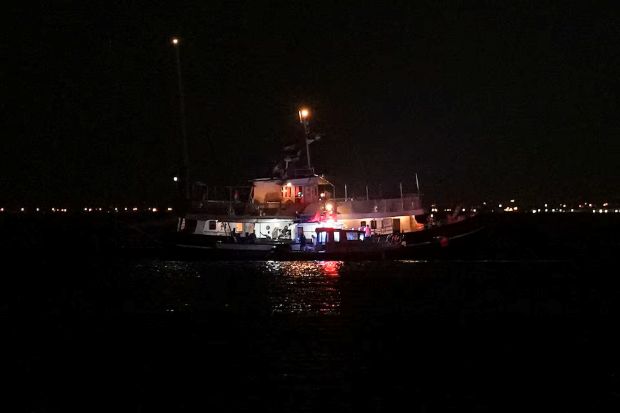Aid group says drone struck Gaza-bound boat docked in Tunisia
By Pranav Baskar and Ephrat Livni
SIDI BOU SAID (Tunisia) – An international group on a mission to deliver humanitarian aid by sea to Palestinians in the Gaza Strip said late Monday (8) that one of its boats, docked in Tunisia, had been struck by what it believed was a drone, resulting in a fire.
No one on the vessel was injured, the group, the Global Sumud Flotilla, said in a statement. It said the boat was docked at the Tunisian port of Sidi Bou Said, part of a flotilla that was on its way to Gaza, when the incident occurred.
The Tunisian national guard, in a statement posted on Facebook, said there was no evidence that a ship in the port had been attacked, dismissing social media reports to the contrary as “baseless”. Based on initial investigations, it said, the fire on the boat appeared to have started in a life jacket, caused by a cigarette butt or a lighter.
In video shared by the aid group, apparently taken on a ship, a man on deck looks up toward the sky, reacts with shock and alarm and backs quickly away. There is a flash of light and the sound of an explosion, followed by cries for help, and smoke emerges from the direction of the ship’s bow.
A Tunisian official told Mosaique FM, a local news outlet, that investigations into the incident would continue. Attempts to contact the national guard were not immediately successful.
The ship, which had set out from Barcelona, Spain, was sailing under the flag of Portugal and was one of the main boats of the Global Sumud Flotilla’s aid operation, the group said. Known as the Family Boat, it was slated to bring members of the group’s steering committee, including Swedish activist Greta Thunberg, to Gaza, it said.
Yasemin Acar, an activist in the convoy, said in a video posted online that “a drone came right above” the Family Boat, “released a bomb, and it exploded, and the boat was on fire”. The fire was put out, she added.
Saif Abukeshek, a spokesperson for the group, said by telephone Monday evening that five people had been aboard at the time, and that about 15 people had planned to go to Gaza on the boat. Thunberg was not one of the people aboard the boat, he said.
Francesca Albanese, a United Nations special rapporteur, said in a social media post from Tunisia that the claim of a drone attack had yet to be verified, but that there was a “history of attacks on the flotilla.” She said that such an attack would constitute an “assault” against Tunisian sovereignty.
The Global Sumud Flotilla said in a statement that its efforts would continue. Asked if the convoy in Tunisia would continue on to Gaza, Abukeshek said, “Yes, we will.”
Attempts by aid groups to bring humanitarian goods to Gaza by sea have been repeatedly thwarted. In May, a Gaza-bound ship called Conscience was hit by explosions and an ensuing fire, halting the mission off the coast of Malta. In June, Israel intercepted the Madleen, whose passengers included Thunberg and a French member of the European Parliament, Rima Hassan. In July, another vessel, called the Handala, was intercepted by Israel.
Those boats were operated by the Freedom Flotilla Coalition, one of a number of groups that have since united to form the Global Sumud Flotilla.
Itamar Ben-Gvir, Israel’s far-right national security minister, threatened this month to designate members of such aid flotillas as terrorists and to detain them.
Global monitors say that extreme hunger is widespread in Gaza and that parts of it are now experiencing famine. Conditions there have grown increasingly dire in nearly two years of war, set off by the Hamas-led attack on southern Israel on Oct. 7, 2023, which killed about 1,200 people.
Israel’s military campaign has displaced most of the 2.2 million Palestinian residents of Gaza, and more than 64,000 people have been killed there, according to Gaza health officials, whose casualty reports do not distinguish between combatants and civilians.
Between March and May, Israel imposed a total blockade on humanitarian supplies entering Gaza, in what it said was an effort to prevent Hamas from diverting supplies meant for civilians. Since May, Israel has allowed some aid to enter, but it has changed how food is distributed. It replaced a United Nations-supported system with hundreds of distribution points with one that is run by American contractors and has few locations, with Israeli soldiers on watch nearby. Many Palestinians seeking aid have been shot and killed.
-New York Times



Comments are closed, but trackbacks and pingbacks are open.